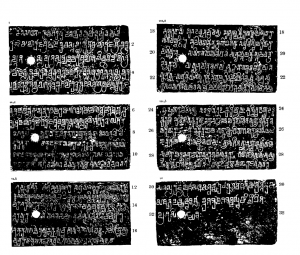
This charter records the donation of a field ‘only for enjoyment’, a farm house and four residences of ploughmen in the administrative division of Kośika. The donation was made to the Brāhmaṇas of the Taittirīya śākhā of the Black Yajurveda and Parāśara gotra by Prabhāvatī Guptā in the 19th year of Pravarasena II’s reign. The charter includes reference to Prabhāvatī Guptā’s Gupta lineage alongside that of her Vākāṭaka heritage. The charter also includes a reference to Prabhāvatī Guptā’s two sons, both of whom were rulers Dāmodarasena and Pravarasena II (Shastri 1997: 21-23).
(Lines 1-12.) Success has been attained by the Holy one. From the heel of the Lord of Râmagiri; the illustrious great queen Prabhâvati-guptâ of the Dhâraṇa gôtra begotten on the queen Kubêranâgâ, the latter born of the Nâga family, a jewel of both the families (of the Guptas and the Vâkâṭakas) meditating on the feet of the Divine one, who has sons and grandsons, a life of full hundred years and will (in the end) live in heaven (or in case Diva has been engraved for Divya: who has renowned sons and grandsons and who has lived a life of full hundred years), the daughter of the illustrious Chandragupta (II) the lord of the great kings, the great devotee of the Divine (Vishṇu); the bestower of many thousands of crores of cows and gold obtained by good government (or by just means) the exterminator of all the kings, unequalled on the (whole)
earth, born of the great queen Dattadêvî, who meditated on the feet of the illustrious great king Samudra-gupta, who was the son of the latter, begotten on the great queen Kumâradêvî, grandson (daughter’s son) of the Lichchhavi (lord), who always caught hold of the feet of the illustrious Chandragupta (I), who was the son of the latter, the son of the illustrious great king Ghatôtkacha who had Gupta as the first King.
(Lines 12-13.) After saying a word about her welfare directs the citizens including Brâhmans and great men of the village in the town of Aśvattha-nagara on the way of Kôsika:
(lines 13-16) Be it known to you that on the 12th day of the bright fortnight of the month of Kârttika of the Nineteenth year of the reign of the great king, the illustrious Pravarasêna of the Vâkâṭakas, we have, to acquire for ourselves religious merit in this world and in the next, given to Brâhmans whose gôtra is the same with Parâśara (i.e., of the Pârâśara gôtra) of the Taittiriya branch, their sons and grandsons (i.e., descendants) while our camp is located here, the field Chatvâra-bhuktak-âbhôga with the sheds of the agriculturists as a grant not previously made.
(Lines I6–24.) We grant the fixed usage incident to a village belonging to a community of Châturvidyas approved of by former kings namely it is not to pay taxes, it is not to be entered by soldiers or umbrella-bearers; it does not carry with it (the right to) the abundance of flowers and milk (or to the wandering about or sitting down) hide, charcoal, (the right of) the miners for exchanging fermenting drugs (or the miners for the purchase of salt in a moist state in case kliṇua is a mistake for klinna), free from forced labour, with treasures and deposits, with fixed and accessory rights; it is to endure for the same time with the Moon and the Sun; it is to follow (the succession of) sons and grandsons (son’s sons). The enjoyment of it should not be obstructed by anybody. It should be protected and increased by all means. Whoever disregarding our grant shall give or cause to given slightest annoyance, shall be punished by us and fined on a complaint being lodged by Brâhmans.
(Lines 24-32.) And in this act of showing regard for religion (or out of respect for religious merit), we do not refer to our protection and care of grants made by many kings who are dead and gone in order to avoid mention of religious merit (or good works). But we snake a request to future (king) won over by expectation of advantage from a pious act, sincere devotion and prowess. And a verse sung by Yyâsa is to be taken as an authority in such matters: “Whoever confiscates land given by himself or others incurs the sin of a killer of hundred thousand cows.” The dûtaka—executive officer—(of this charter) is Vêvandasvâmi. This (charter) is written by Prabhusingha (Prabhusimha).